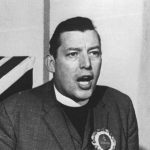 Ian Paisley (1926-2014) was a Loyalist political leader and Protestant minister. Paisley emerged as a rabble rousing street preacher during the 1960s before becoming the founder of the Democratic Unionist Party (DUP) and the figurehead of staunch Loyalism. He was later an integral figure in the Northern Ireland peace process, serving as its First Minister alongside Martin McGuinness. Ian Paisley was born and raised in Ballymena, County Armagh, not far from the border with Ireland. His father James was a Baptist preacher who had served with the Ulster Volunteers after World War I. Paisley followed his father into the Baptist ministry, studying theology at an evangelical college in Wales. He was ordained as a pastor after returning to Belfast.
Ian Paisley (1926-2014) was a Loyalist political leader and Protestant minister. Paisley emerged as a rabble rousing street preacher during the 1960s before becoming the founder of the Democratic Unionist Party (DUP) and the figurehead of staunch Loyalism. He was later an integral figure in the Northern Ireland peace process, serving as its First Minister alongside Martin McGuinness. Ian Paisley was born and raised in Ballymena, County Armagh, not far from the border with Ireland. His father James was a Baptist preacher who had served with the Ulster Volunteers after World War I. Paisley followed his father into the Baptist ministry, studying theology at an evangelical college in Wales. He was ordained as a pastor after returning to Belfast.
Despite his young age Paisley became well known for his fundamentalist religious views and social conservatism. Initially ordained in the Irish Presbyterian Church, in 1951 he led a fundamentalist faction that broke away to form the Free Presbyterian Church of Ulster. Paisley frequently courted controversy with his public remarks, many of which targeted Catholics or Catholicism. In 1956 he helped a 15-year-old Catholic girl leave Belfast and convert to Protestantism, while refusing to tell her family about the girl’s whereabouts. Two years later Paisley accused the Queen Mother of “fornication and adultery with the Anti-Christ” after she met Pope John XXIII. In 1988 he was forcibly expelled from the European Parliament for interrupting a speech by Pope John Paul II and denouncing him as the Anti-Christ. Paisley also advocated tirelessly for ultra-conservative causes. In 1977 he launched a campaign called “Save Ulster from Sodomy”, an attempt to block the decriminalisation of homosexuality.

Paisley’s religious views and staunch Unionism drew him into the political realm. In the 1950s he was arrested for inciting sectarianism and intimidation of Catholics. In the mid 1960s Paisley campaigned and protested against Northern Ireland prime minister Terence O’Neill, who sought reconciliation with the Catholic community. Paisley was also a strident opponent of the Northern Ireland Civil Rights Association (NICRA), a group he considered a front for militant Irish Republicanism. During the late 1960s Paisley organised counter-protests to civil rights marches, some of which turned violent. He was imprisoned twice for public order offences, once refusing to sign an agreement to behave peacefully. The outbreak of the Troubles prompted Paisley to seek political office. In June 1970 he was elected to the British House of Commons, representing North Antrim. He would hold this seat for just under 30 years. In September 1971 he became the founding leader of the DUP, holding that position until 2008. Paisley also held a seat in the European Parliament between 1979 and 2004.

By the mid 1970s Paisley had become the face of defiant and immovable Loyalism in Northern Ireland. He opposed any form of power-sharing government in Northern Ireland, leading protests against the Sunningdale Agreement (1973) and the Anglo-Irish Agreement (1985). Paisley supported and campaigned for Loyalist political candidates; he appeared regularly at public gatherings or in the media; and he made regular and at times inflammatory remarks about Catholics, Nationalists, Sinn Fein and the Irish Republican Army (IRA). Under Paisley’s leadership the DUP withdrew from several peace negotiations, including the Good Friday Agreement, because of its determined refusal to talk with Sinn Fein. Paisley’s position had moderated by the mid 2000s, possibly due to a life threatening illness. He met Irish taoiseach Bertie Ahern in 2004; two years later he represented the DUP in talks that culminated in the St Andrews Agreement. In 2007 Paisley became First Minister of Northern Ireland alongside McGuinness, with whom he formed an unlikely friendship. Ian Paisley retired from most of his political and religious offices in 2008 and died six years later, aged 88.
© Alpha History 2017. Content on this page may not be republished or distributed without permission. For more information please refer to our Terms of Use.
This page was written by Rebekah Poole and Steve Thompson. To reference this page, use the following citation:
R. Poole & S. Thompson, “Ian Paisley”, Alpha History, accessed [today’s date], https://alphahistory.com/northernireland/ian-paisley/.
